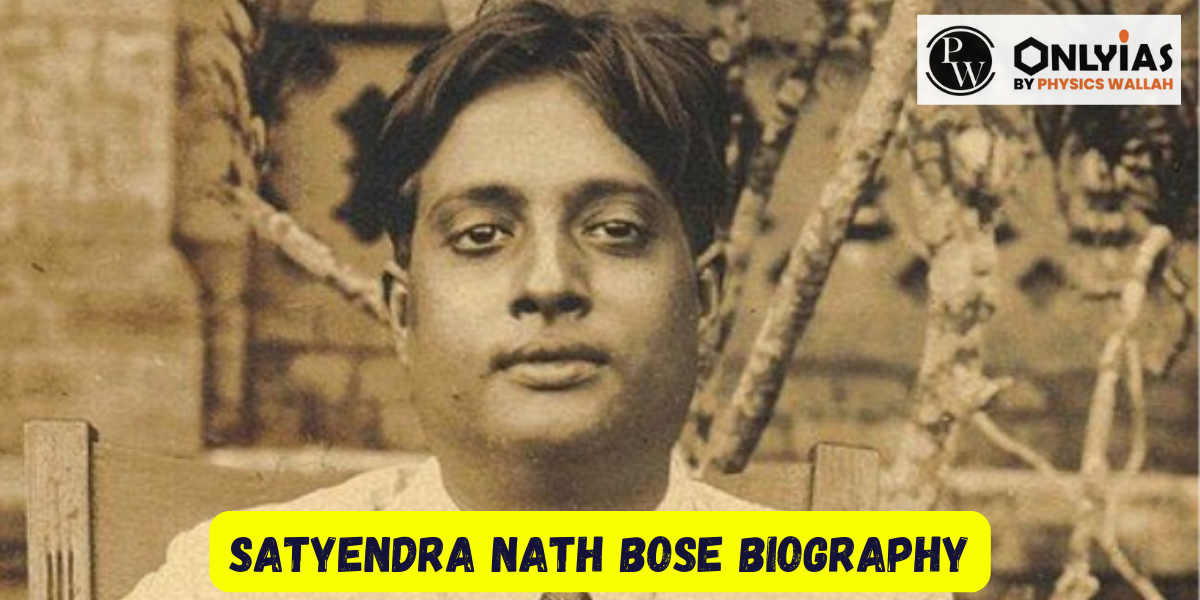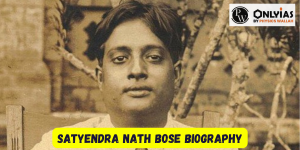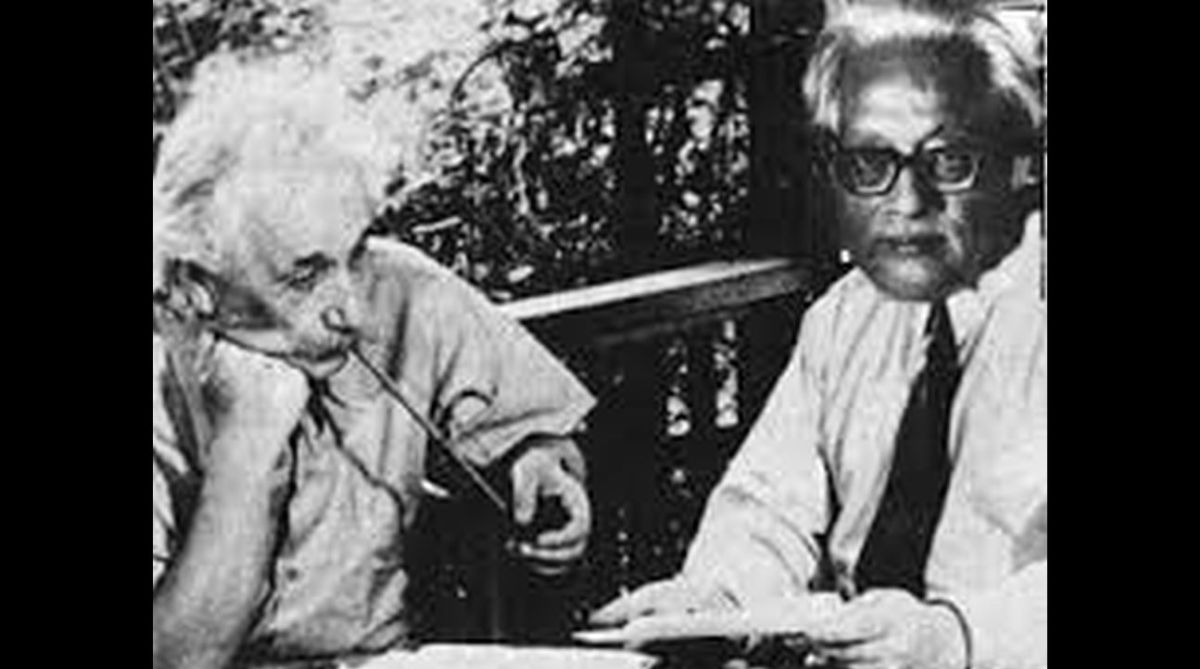Explore the life and legacy of Satyendra Nath Bose, a pioneering Indian physicist whose work with Einstein led to Bose-Einstein statistics and the concept of bosons in quantum mechanics.

Satyendra Nath Bose, born on January 1, 1894, in Calcutta (now Kolkata), India, was a renowned mathematician and physicist known for his collaboration with Albert Einstein on a theory related to the gas-like behavior of electromagnetic radiation. He passed away on February 4, 1974, in Calcutta.
Throughout his education in high school and college, Satyendra Nath Bose exhibited exceptional brilliance as a student. He consistently secured the first position in all his exams, including those for his graduate and post-graduate degrees. In 1915, he obtained an M.Sc. in mixed mathematics from Presidency College in Calcutta. He later began his teaching career at the University of Dacca (1921–45) and subsequently returned to Calcutta (1945–56).
During his lifetime, Satyendra Nath Bose contributed significantly to various scientific fields. He authored numerous scientific publications between 1918 and 1956, which advanced areas such as statistical mechanics, ionosphere’s electromagnetic properties, theories of X-ray crystallography and thermoluminescence, and unification field theory. One of his notable works was “Planck’s Law and the Hypothesis of Light Quanta” (1924), which caught the attention of Albert Einstein, leading to their fruitful collaboration.

Satyendra Nath Bose was born on January 1, 1894, in Calcutta (now Kolkata), India, into a middle-class Bengali family. From an early age, Bose displayed an extraordinary aptitude for academics and showed a keen interest in mathematics and science.
Bose’s academic journey began at the Hindu School in Calcutta, where he excelled in his studies. He continued his education at the Presidency College, Calcutta, where he pursued his undergraduate studies in mathematics. During his time at the Presidency College, he demonstrated exceptional talent and consistently secured top positions in all his examinations.
After completing his undergraduate degree, Bose continued his academic pursuit at the University of Calcutta, where he pursued his master’s degree in mixed mathematics. Once again, he achieved remarkable success and obtained his M.Sc. degree in 1915, standing first in the examination.
Even in his early life, Satyendra Nath Bose showed a curiosity for scientific research. He was influenced by the works of renowned physicists and mathematicians of his time. He delved deep into the study of mathematics, physics, and other scientific disciplines, nurturing his passion for understanding the intricacies of the universe.
Bose’s brilliance in academia and his eagerness for scientific exploration led him to develop a strong foundation in mathematics and theoretical physics. This laid the groundwork for his future contributions to the field of science.
Throughout his academic journey, Bose’s dedication and academic prowess gained recognition from his teachers and peers alike. His exceptional intellectual abilities earned him a reputation as one of the brightest minds of his generation.
As a young scientist, Bose’s curiosity and passion for scientific inquiry only grew stronger. Little did he know that his work would lead to groundbreaking discoveries in the field of quantum mechanics and lay the foundation for the concept of bosons and Bose-Einstein statistics.
Satyendra Nath Bose’s education and early life played a pivotal role in shaping his future as a distinguished physicist. His academic excellence, passion for research, and determination to explore the mysteries of the universe paved the way for his remarkable contributions to science and his lasting legacy in the field of theoretical physics.

| Date | Event |
|---|---|
| January 1, 1894 | Satyendra Nath Bose is born in Calcutta (now Kolkata), India |
| 1915 | Completes M.Sc. in mixed mathematics from Presidency College, Calcutta |
| 1921 – 1945 | Teaches at the University of Dacca |
| 1924 | Publishes “Planck’s Law and the Hypothesis of Light Quanta” |
| 1926 | Appointed Head of the Department of Physics at Dhaka University |
| 1937 | Rabindranath Tagore dedicates his only book on science, “Visva–Parichay,” to Satyendra Nath Bose |
| 1945 – 1956 | Returns to Calcutta and continues teaching and research there |
| 1954 | Honored with the title Padma Vibhushan by the Indian Government |
| 1958 | Becomes a Fellow of the Royal Society and nominated as a member of Rajya Sabha |
| 1959 | Appointed as the National Professor, the highest honor in the country for a scholar, a position he held for 15 years. |
| February 4, 1974 | Satyendra Nath Bose passes away in Calcutta |
One of Bose’s most significant contributions to physics came in 1924 when he derived a new statistical formulation known as Bose-Einstein statistics. This statistical theory described the behavior of certain types of particles, later called “bosons,” which include photons (particles of light) and subatomic particles like mesons and certain atomic nuclei. Bose sent his research findings to Albert Einstein, who recognized the importance of Bose’s work and helped publish it in the scientific community. This led to the development of the Bose-Einstein condensate, a state of matter that occurs at extremely low temperatures.

After his groundbreaking work on Bose-Einstein statistics, Bose continued his academic career in India. He became a professor at the University of Dhaka (now in Bangladesh) and later returned to Kolkata, where he served as a professor at the University of Calcutta. Bose’s contributions to physics and mathematics were widely recognized, and he received numerous honors and awards throughout his career.
Satyendra Nath Bose passed away on February 4, 1974, in Kolkata at the age of 80, leaving behind a lasting legacy in the field of quantum mechanics. His work on Bose-Einstein statistics laid the foundation for further advancements in quantum physics and has had a profound impact on our understanding of the behavior of particles at the atomic and subatomic levels.
Bose’s contributions to science continue to be celebrated, and his name is honored through various scientific institutions and initiatives, including the prestigious Bose Award for Physics, established in his memory. His pioneering work has inspired generations of physicists and stands as a testament to the brilliance and ingenuity of Indian scientists in the field of theoretical physics.
Satyendra Nath Bose was a brilliant Indian mathematician and physicist who made significant contributions to the field of quantum mechanics. His notable achievements include:
Satyendra Nath Bose’s contributions and achievements in the field of science were remarkable and have left a lasting impact on theoretical physics. Some of his significant achievements include:
Satyendra Nath Bose’s legacy continues to be celebrated in the world of science. His contributions to quantum mechanics and statistical mechanics have shaped modern theoretical physics. Some of the key aspects of his legacy include:
Satyendra Nath Bose’s profound impact on theoretical physics and his relentless pursuit of scientific knowledge have made him one of the most illustrious figures in the history of science. His legacy lives on through his groundbreaking work and the recognition he has received for his exceptional contributions to the field of science.
Ready to boost your UPSC 2026 preparation? Join PW’s UPSC online courses today!
Satyendra Nath Bose is renowned for his work on quantum mechanics, specifically the theory of relativity. In 1924, he derived Planck's quantum radiation law in a paper without reference to classical physics.
Satyendra Nath Bose's notable invention is the concept of bosons, which are a class of elementary subatomic particles with integer spin.
Satyendra Nath Bose is considered the father of quantum statistics. He founded quantum statistics in 1924 with the discovery of the Bose-Einstein statistics.
Yes, the word 'boson' was named after Satyendra Nath Bose by Paul Dirac, a Nobel Prize-winning physicist, to honor Bose's contribution to the Bose-Einstein statistics.
The term "God particle" is often associated with the Higgs boson, not the bosons discovered by Satyendra Nath Bose. The name "God particle" came from a book title by Leon Lederman, referring to the Higgs boson's significance in explaining the origin of mass in the universe.
Leon Lederman, a Nobel Prize-winning physicist, is known for coining the term "the God particle" to refer to the Higgs boson's significance in explaining the fundamental nature of matter.
<div class="new-fform">
</div>